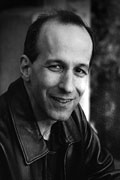
September 01, 2010
If you have trouble viewing this newsletter, set up your email options to "always allow images from this address."
We are pleased to bring you BCQ's own series, Life Between My Pages!
This series will feature a selected author each month who will share with you their personal story about how they got to where they are today.
Prepare to be completely WOWED by these writers! You've read their books, fallen in love with their style, now learn about their journey.
Each month, when the newsletter shows up in your inbox, look for the featured author's name in the subject line. Some authors you will immediately recognize, some you will not. We can assure you that every single author invited to participate will tell a story you won't want to miss!
September 2010:
Joshua Henkin

My path to becoming a novelist was long and circuitous, and filled with enough coincidences that a lot of people (most especially myself) are surprised that I ended up becoming one. Yet I always wanted to write fiction. I also always wanted to be a basketball player, and at some point you realize youíre neither good enough nor tall enough. At a certain point itís time to get real. And for me, getting real meant pursuing a Ph.D. in political theory. This was because my father had had a long and successful career as an academic, and so, in the spring of 1987, when I graduated from college, I was probably the only person in America who was under the impression that a Ph.D. in the humanities was a safe choice.
But before I ventured down that path, I decided to take a year off. A year off from what? From school? From my life as I had known it? I had no idea, but I sensed it meant abandoning the coast on which Iíd grown up and, like a prospector for gold, lighting out for California. I had this idea about Berkeley, probably because I grew up in Morningside Heights, just blocks from Columbia University. Born in 1964, I think of the campus protests as my first memory: my mother taking me to nursery school, and weíre turned back at the gates of College Walk. It was my version of a snow day. At least as I imagined it, if Columbia was good (land of sex and late-night parties and political tumult), then Berkeley was even better. And so, in August of 1987, I found myself sleeping on the floor of a friend of my college roommate, who was good enough to allow me to lay out my sleeping bag until I found more permanent lodging.
And, while I was at it, a job. Because even in Berkeley a young man needs to pay the rent. And so, after a series of failed interviews, I found myself as a badly compensated intern at a magazine, and then, once the rest of the staff had quit or was fired, as the assistant editor. One of my jobs in that capacity was to read the fiction submissions and pass the promising ones along to the fiction editor. The thing was, the vast majority of the submissions were atrocious. Every week (every day!) scores of them would come in, and all I could think was, Oy. It wasnít as if I thought I could do better; in fact, I knew I couldnít do better. But I felt oddly inspired. If other people were willing to try and risk failure, I thought I should be willing to risk failure, too. So I took a fiction-writing workshop at U.C. Berkeley, and then another one, and I got some encouragement (as well as some pointed criticism), and then my year off was over and I took another year off, and soon four years had passed, at which point my dreams of a Ph.D. in the humanities were precisely that (Political theory? Why study political theory?), and I found myself more than halfway across the country, boomeranging my way back toward the East Coast, though not before a long pit stop (what I thought would be two years ended up being eight) in Ann Arbor, where I would get my MFA and then teach writing in the English department at the University of Michigan.
The rest, as they say, is history. Except history, looking back, is rarely as itís experienced in the moment. I could say that I had a few short stories published when I was in graduate school and that, a couple of years after I graduated, I signed with a well known New York agent, who promptly sold my first novel, Swimming Across the Hudson, to a famous editor at a big publishing house, based on only the first fifty pages (Ah, for those far-off days of the nineties, when the world of publishing seemed like a tenable pursuit!) And though all this is true, it doesnít take into account the numerous rejections along the way, the short stories sent out and returned with nothing but coffee stains. Iím not complaining; I live a charmed life. But anyone who isnít ready to endure rejection, and to continue enduring it as long as they write, isnít cut out to be a fiction writer.
I now direct the graduate program in fiction writing at Brooklyn College, and I tell my students that the best thing they can do is intern at a literary journal and read the slush pile. Itís what I did, and itís thanks to that that that Iím a writer. It steels you against rejection. It makes you realize how much luck is involved. It also makes you your own best, most ruthless editor. A spelling error on the first page? A punctuation mistake in the third paragraph? An editor will do anything not to read on. Not because editors are mean-spirited, but because theyíre overworked, and so you best not give them a reason to put your manuscript down.
Thereís a whole lot of luck along the way. Swimming Across the Hudson, snatched up by that big editor and published to excellent reviews, sold very few copies because my editor was dying when the novel came out and there was no one to lobby for the book. My second novel, Matrimony, on the other hand, would seem to be a hard-luck story. It took me ten years to write it, and I threw out more than three thousand pages along the way. In earlier incarnations, it was rejected by close to thirty publishers. Yet when it was finally bought by a terrific publishing house and a brilliant editor who, Iím happy to say, is alive and well, and when I had rewritten it and rewritten it and rewritten it once more, the stars were aligned. The reviews were terrific, the sales strong, and I had the privilege in the couple of years after it came out to discuss the book with more than two hundred book clubs, and I have still more discussions lined up.
Now Iím close to finishing my new novel, The World Without You, and the process will begin all over again. Which is how it should be. A writer writes. Then he sends his book out into the world to see what becomes of it. And then he writes some more.
Joshua Henkin is the author the novels Swimming Across the Hudson, a Los Angeles Times Notable Book, and Matrimony, a New York Times Notable Book. His new novel, The World Without You, is forthcoming from Pantheon. He lives in Brooklyn with his wife and two young daughters and directs the MFA program in fiction writing at Brooklyn College.
Learn more about Josh at JoshuaHenkin.com.
Please visit BCQ at In the Streets in Frederick, MD on September 11, 2010.
For more information, visit our Events page.
Have a friend who would enjoy Book Clubbers?
We would be honored for you to share our newsletter with any book lover you know!
Are you reading this on a recommendation?
If you like what you see, come
sign up
with us! It's quick, easy, and free!